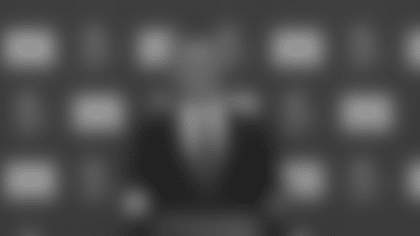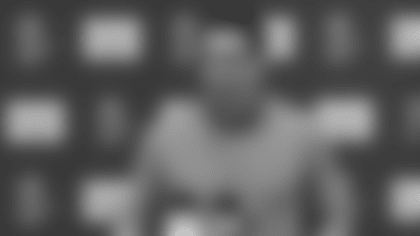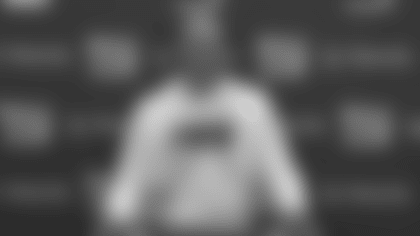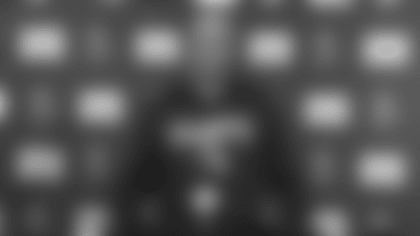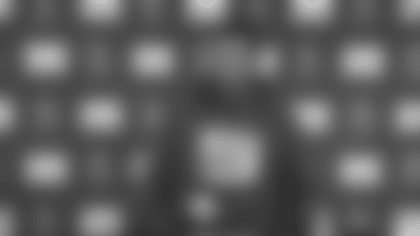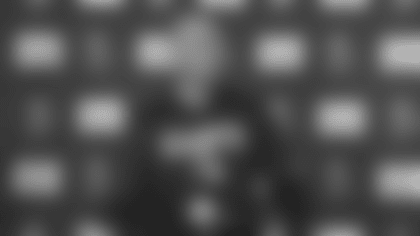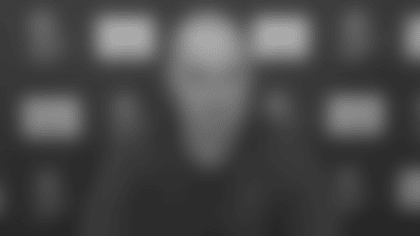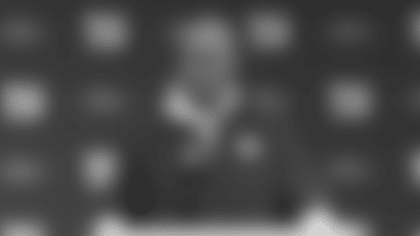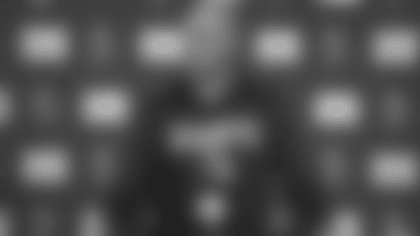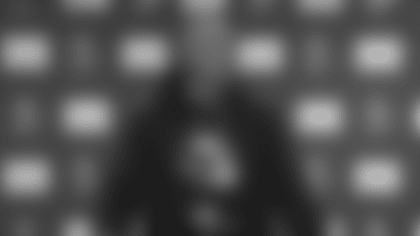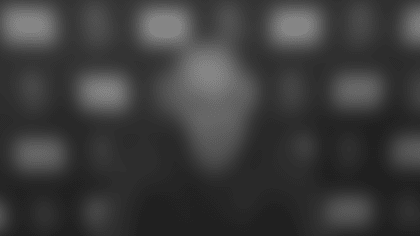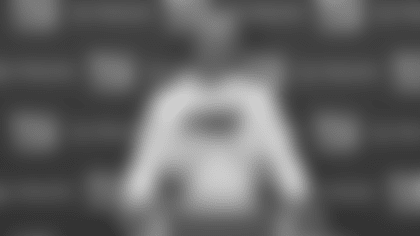Inside the 5-yard line. Six years ago it was the 20, then it went to the 15, the 10 and last year it ended up at the five.
First off I wanted to try to do this without speech, but I was thinking about it last night, that I just couldn't because I didn't want to forget anything. And I didn't want to forget anyone. So if it gets too long, please don't start rolling the credits.
First, I would like to start off by thanking the Mara and the Tisch families, Ernie Accorsi for bringing me to this great organization, Jerry Reese, Ronnie Barnes, Byron Hansen and all of my teammates and coaches and friends at the Giants organization and in the building. A special thanks goes to Tom. I have always been a believer in the way that he prepares his players and how he is so dedicated to his profession. I admire the way that he coaches on Sunday and more importantly the kind of person that he is. Tom has always been there for me. He has been such an incredible role model and a huge presence in my life for the past six years, little things that he has said – we have a great relationship. I have always been able to walk into Tom's office and talk to him about anything – football, family, whatever it is.
The biggest thanks goes to my incredible family down here in the first row. My wife Michelle has been with me for 22 years. She has been my heart and soul, my coach and my sports psychologist, my nutritionist and my sounding board; most of all, my best friend. And my four boys, CJ, who is not here today, Blake, Trevor and Zack, for supporting me and loving me through my career in the National Football League. To my parents who have traveled to see me play and have been though the ups and the downs and the rest of my family who have always cheered and supported me.
To the fans, most importantly, the New York Giants fans who have always been great to me. There is no better place to play the game you love than in New York. I will miss you all.
I want everybody here today to know how truly blessed I am. To be able to play in three decades and witness the many changes in the National Football League. As an undrafted free agent in 1988, I would have never thought I could have played this wonderful game for 22 seasons and appreciate all the National Football League has given me. One thing I never did was take anything for granted in my career. I was always grateful to have a job and be able to take care of my family. I always had a fear of losing my job and tried to always work harder than the next guy. I wanted to be the best at my position and do everything I could to help the team win. This game teaches you to be a man and forces you at a young age to grow up quickly. Commitment and sacrifice are part of the process of becoming great. I felt that I gave my teammates and coaches that commitment and sacrifice every year that I played this game. I only hope that the other players really appreciate what the game of football, and what the National Football League, has to offer, and that each and every one of them makes the best of their opportunity – never quit, never say never, and believe that you can do anything.
Today is the start of a new chapter of my life – a chapter that will bring happiness and also opportunity, an opportunity to spend time with Michelle and the boys, a chance to coach and attend my sons' games and activities. And one lesson that I have learned from playing football in the National Football League is that it takes a toll on your body. And eventually tells you that you can't do it any more. And that day is today. As players we have to be certain that what we are doing off the field will benefit us on the field. It takes so much to play this game. And in order for me to be successful there is a certain amount of preparation physically that I have to go through. Unfortunately I'm not able to keep up with that at that type of physical preparation. And that is why today I'm officially retired from the National Football League, as proud as ever.
As I got older one of my goals was to be able to walk away from this game on my own. And I'm achieving that today. I think about some of the things that I will miss the most – driving into the Stadium and seeing --- these might sound a little corny but they mean a lot to me. Just driving into that Stadium and seeing the smoke coming off these grills and smell the sausage and peppers – seeing all of the fans cheering as you drive into the players' lot, hearing Bob Sheppards' voice on game day, the competition – always trying to be better than the other guy across the field. The games on Sunday, my teammates and coaches, seeing how they work on game day, seeing how happy they were after a great win, and especially when we hoisted that Super Bowl trophy in 2007. I will miss wearing the Giants uniform like I did for seven years. And really, I will just miss being a football player.
As Tom Coughlin once told me a few years back, this is what you do. You are a football player. I will always be a football player and I'm proud to say that I will always be a New York Giant.
Once again, I thank the whole Giants organization for all of the support that they have given me – me and my family – over the years. I also want to thank everyone that came here to celebrate this wonderful day.
Q: Does winning a championship make it easier to walk away?
A: I think, yeah. This ring is what we all go for, and as a professional athlete to be able to wear one is so important. You look at people who play the game a long time and didn't get Super Bowl rings. So I just wish we could have gotten a couple more.
Q: What happened between April 1 when you decided to come back and today?
A: My mind was telling me that I want to come back and do this. And I think my mind will always tell me that I want to do this – because it is a great game, the game of football. I have been doing it for half my life. But I started working out and my body -- it is just not recovering the way it is supposed to. I have always been very, very hard in my training. And that is, I think, why I have been able to play so long is by being in shape and doing the things you need to do. But I just can't – I just can't do it any more. My body is not letting me respond to it. So it is time to move on.
Q: Will you keep punting?
A: No. I have taken my last swing. That is it. When I'm coaching CJ and Blake and the boys, they are going to have to keep up with me a little bit. But I'll still kick it out there. But that is why I appreciate the opportunity to even just be up here at the podium and telling people that I'm finished. Because that is what it is. I'm not going to be the guy that goes back and says, "Yeah, I'm going to be training." I was trying to train to play this game. So if I was going to train, I would play. I'm not going to be that guy that is coming back and pull a Brett Favre on you.
Q: Do you have any interest in coaching at the NFL level?
A: I don't know. To me, I enjoy coaching, especially junior football. They don't really talk back to you then. And we don't have team meetings. But I think at some point in time I would like to give back to some people that want to learn. It is a very difficult skill. And it is not easy.
Q: Will you work with either of these two punters here?
A: If they want to drive up to Ridgewood, I will.
Q: Will you come here and give them any input?
A: We'll see. I'm just trying to take a step back and really just relax a little bit and kind of think about the future.
Q: Your legacy will be about directional punting. It is sort of a lost art.
A: It is not easy because when I first started to come into the NFL there was really no directional punting. It took me a good six or seven years to learn how to do it – and that is in games. And going out there and trying to put the ball where you want to under extreme circumstances with 11 guys coming at you – or 10. As the League kind evolved – at one time or another there might have been two or three guys in the League that could return punts. Now they are lining up every weekend with guys that can do it. So I think with directional punting I got ahead of the game and was able to really define on how to do that. I wasn't the strongest and couldn't kick it the farthest in later years but I could put it exactly where I wanted to. And from a coaching point of view, that is what Coach Coughlin wants and any special teams coach wants to do.
Q: What made you start doing that?
A: Al Roberts was one of my special teams coaches in Arizona. He said, "Listen, I think that you could do this. Let's try to kick away from the returners." I said, "That sounds like a logical thing to do." But it took some time and a lot of work – a lot of work. It worked to my advantage over the years because I could really mess with those guys back there. There were the Brian Mitchells of the world and guys like that would get in my head and I would have to get them out of there very quickly. And just by being able to know that I could put that ball on the sidelines whenever I wanted to. And then as I moved up into the 50 I just took the directional punting aspect and shortened the field and just ripped it down there. Of all of the thrills that I get out of a football game – other than winning – was to help our team and put that defense on the field and backed up. Because the Eagles that I played for back in the '90's, we had an unbelievable defense. And Buddy Ryan always told me that as long as you can keep doing that you can have a job. You just take a defense and put them on the field and shorten it up for them, that was always a good thrill for me.
Q: Were there one or two games that you remember?
A: There was one game that comes to mind. It actually was against the New York Giants when I was with the Seattle Seahawks. I had six inside the 20 that day. And I think it was a 9-6 game. So lo and behold, the next year I was a New York Giant. …… how things go. But I will tell you this, you might think I'm crazy, but the Meadowlands was always one of my favorite places to play before I was a Giant. I loved coming here; I loved to see the fans. It is a football stadium. And the challenge that I always took was, "Oh the Meadowlands is so windy." Well, you know what – who cares. That is the challenge. Let's go in there and try and defeat the wind. It got me some days but for the most part – I don't know what is going to happen in the new stadium. But we'll see.
Q: What were your secrets of dealing with the Meadowlands?
A: One of the secrets is that when we were practicing at the old stadium, we went down and practiced there. We knew the winds and we knew on game days – there were some days that we were at practice and it was very rare that the wind was blowing a certain way. Lo and behold on game day we might have had that same situation. And the other guys had no clue. The other clue was that I never gave any of my secrets away to them. I always used to tell them, "Look at the flag and that is the direction the wind is blowing." It was completely opposite. Secrets, right? It is a challenge and you just have to rely on your ability to just mentally get through it.
Q: Will you talk about the responsibility that you have always accepted of being a New York Giant and being a professional in sports.
A: I think that being a New York Giant came with a lot of responsibility. One, being a part of one of the greatest organizations around. Number two, being in a big market that you have to be able to behave yourself and set yourself up as a role model. And those things right there automatically give you some responsibility. I have a family and certainly playing for the New York Giants, I had to represent the person that I am to my family and to the fans and to the organization. I want to think that the way that I prepared myself with my career and the work ethic and the type of person that I am, that hopefully a lot of people in that locker room have been able to learn from. And I hope so.
Q: Over the course of your career, was there ever a point where you were said, "I want five years, I want ten years, I want 12 or I want 15?"
A: I got cut one time. I lost my job one time. And I said earlier that I was always afraid to lose my job. And that should be the norm. Everybody should be able to say, "I don't want to lose my job." I lost my job in 1990 when I was with the New England Patriots. And I vowed this would never happen. It was horrible. So after that I worked extremely hard, so I could say that this would never happen again. Then I got into five years and thinking and talking to Michelle, "Wow, we made it five years." And then I had the opportunity to go back and play in Arizona in my hometown and my family was living there. Before you know it I'm moving on to Seattle. Now we're talking – now we were up there in the 10's. So to be sitting here at 22 years, there is no way I would have ever believed it. But I will tell you this, I took it one year at a time; one kick at a time. And before you know it I'm standing up here like this. And it has been a great, great ride.
Q: Did you come close to missing a game?
A: Twice
Q: What were they?
A: I broke my arm on a tackle. I either get run over or I break my arm or get a rule named. But when I was in Seattle I had broken the radial head of my elbow on my drop hand. That was close. But at that point I was just ……, "You know what, I'm a punter, I can go out there and kick it." And that was the mentality that I had. And the other time was my 300th game. The 300th game my knee was brothering me. And we brought in Sean Landeta, who I respect very much. And one thing Sean was telling me that day – he was trying to tell me about the wind in the Meadowlands. I said, "Sean, I think I understand the Meadowlands winds." But that was my 300th game and there was no way that I was going to miss that game. So those times would probably come to mind.
Q: Did you continue to play with a broken arm?
A: Yeah, broken meaning that it wasn't hanging; the wonders of medicine.
Q: most memorable game
A: The one here at the Meadowlands against the Giants. Yeah, I don't remember it. I just remember it being one of those games where when I was on the field I knew that I could do anything I wanted that day. And that is rare that you as an athlete you can go out there and say, "You know, I'm going to control this game." Amani Toomer was back there and I'll never forget walking off the field he said, "Wow, you're good." I said, "Well, you're good, too. That's why I kicked it away from you."
Q: But in general did you appreciate the anonymity about the position? People don't talk to punters, don't worry about them very much.
A: I have accepted it. It is what it is. I got a press conference. So that is good for me.
Q: Was Brian Mitchell the only guy that got in your head?
A: There are too many to list, really. There really are. And you know I'm not going to be able to kick to DeSean Jackson this year. And that upsets me.
Q: Is there a particular punt from your Giants days that you will remember?
A: The first punt of the Super Bowl, no question. Just knowing that you run out on that field and you have waited so long to get to that game. And being a veteran, you figure that everything is going to be okay. But I was so nervous on that kick; I was thinking, "Wow, this is ridiculous." And to just get it off – to make it effective and go off the field and take a breath. There are so many I just haven't had a chance to go back and think about it.
Q: You had said, "I'll review my season and make a decision and I'll know when it is time." Now that it is time and you have made the decision - did it take a long time?
* *A: It was a process. You will get a kick out of this. Michelle and I have talked about this for a while. We will have coffee before the kids get up and talk about the day, talk about the month, the future. And a week ago Monday I just got out of bed and the Good Lord above told me – sent me a sign that day – and said, "You know what, you are done, you are finished." And I just didn't feel good. My back was hurting, my knee was starting to swell up again and I just said to myself, "I can't do this anymore." And that is when I decided to start the coffee pot. And so it was quick. And I think that I reacted on it in a way that I should. I came down and talked to Tom that afternoon. He asked me for one more favor. He said, "Would you sleep on it?" I said yeah. And I went back and just kind of really thought about what I was doing and I just felt it was time. It was a very quick decision finally.
Q: Will directional punting be phased out after you retire?
A: No, it can't. If I'm a coach, I'm teaching my guy to do it. Because there is no way that you are kicking that ball down to these athletes ……… Unless you have 10 first round draft picks covering your punts – which you are not going to. But these guys have got to learn. I'm teaching CJ; I'm going to teach Blake. These guys have to learn how to directional kick. That is what I think. It could be a complete different theory from someone else but it is just too dangerous to kick to these guys. I think more people have to start learning how to do it.
Q: When you talk to these two young punters that are trying to fill your shoes, what is the one thing that you would tell them is the most important?
A: They have to be consistent. And they are going to have to understand that when they are back there the team is relying on you and you have to execute … one kick at a time. It is not going to be pretty. It is going to be a long process for those young guys. Punting is not something that all of a sudden one day you wake up and you are good. They are going to have to work and they have to work hard – extremely hard. And they are going to have to understand that they are going to have their ups and downs, and to not get too low and not to get too high. But I would tell them that they need to kick and kick and kick and kick and kick more. They have plenty of time to rest – they are young.
Q: We were watching you one day in the bubble kicking across the field into garbage cans for accuracy. When did you know you were that good? When did you know in your career that you could put a ball – not in a garbage can necessarily but you could nail it?
A: That is a good question. I never really looked at it saying, "I can do this – I can do that." It is just more of a natural – something natural that I just --- I pick a line and know how it is going to come off my foot and to it hit --- I hit the trash can – I didn't put very many in it. Just game that we play. And I'm glad that you picked up on that because I don't think Tom ever saw us doing that. When you are locked in mentally and you know physically and the way the ball is going to come off your foot – like a golfer – you know how to hit a sand wedge or you know how to hit a seven iron 150 yards. You just kind of know how to control it. Probably about 10 years ago is when I started to kind of feel, "Listen, I know how to …… down this inside the 20 kick and when we are backed up, I know how to crank it." And then you just hope that when you crank it you have guys down there that can run down and get those guys.
Q: Did you ever share a laugh with Jeremiah Trotter about that hit he laid on you in Philly?
A: No, I haven't. I still think I have some residuals in my neck from that hit, though, I really do. I had to be smarter – I just can't run down and start to get involved in football games like that. That was a hard hit.
Q: Did you lose any power over the years?
A: Sure. And I think that was part of – two years ago I probably had my best season as a pro. And then to come back last year to see some of the physical aspects – I just didn't see the ball coming off my foot. So going into this season I needed to change some things. And part of that was that I needed to get stronger. Unfortunately at my age and with my knee, there was a lot of stuff that I can't do to get stronger lifting wise. I tried to create some things to do it and Jerry Palmieri was just wonderful with me and working as hard as we could. But it just didn't happen. So that strength starts to go down you just can't ........as far you want to any more. And that was what I was afraid of. I didn't want to get out and put my team or myself at risk in going on the field and not producing the way that I am normally producing, because I am miserable when I'm not playing well. Michelle can attest to that and so can the kids. But I didn't want to go through that again because I didn't think that I could train and get the strength back in order to be at a level that I wanted to.
Q: There are no punters in the Hall of Fame. Do you think there should be?
A: Absolutely. I think it is part of the game. There is a kicker in the Hall of Fame. There should be a punter in the Hall of Fame. Especially if you look and go back and ask people how important that position is, I think it is very important. It changes the complexity of the game some days. And definitely somebody should be in there.
Q: We can't come over to your locker any more and ask you about the pulse of the team. So as you leave the team, what would you tell those guys who are still in the locker room?
A: I would ask that the leaders in that locker room step up and decide to take control of their own team and get the New York Giants back to the Super Bowl. It takes leadership inside that locker room and the younger guys, which this team is being made up of, have got to understand and listen to the older players. And those older players have to teach these young guys how it is done. And don't be afraid if they don't like you. If you tell them what you are doing, tell them this is how we do it here, and that is what I would say that is the best thing in that locker room for next year.


